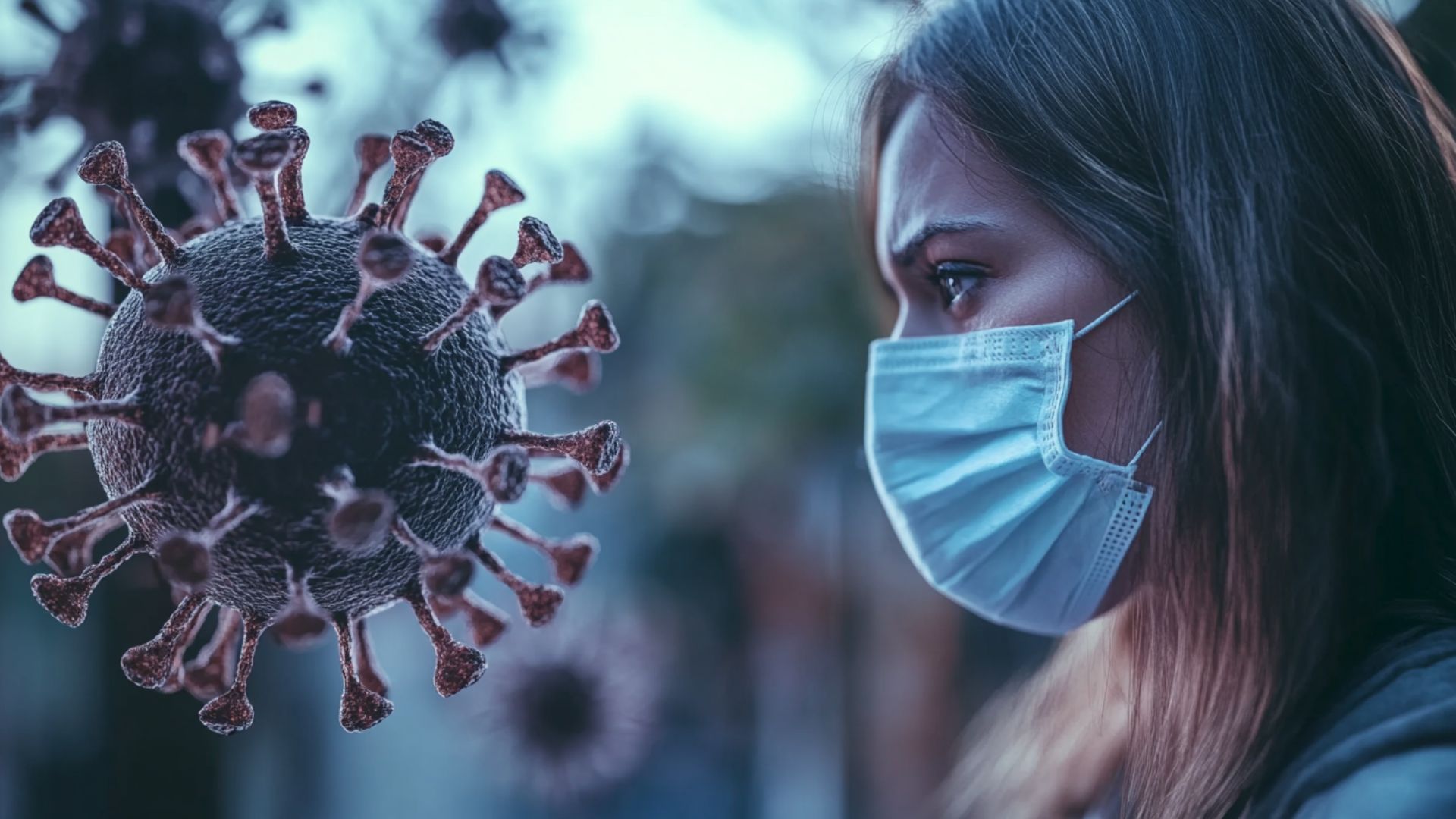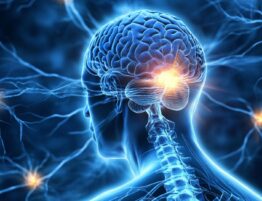Understanding how COVID-19 affects the brain and nervous system has become crucial in SARS-CoV-2 research. The virus can impact neurological function in various ways, causing symptoms ranging from loss of smell and taste to headaches, dizziness, and confusion. In more severe cases, patients may suffer from strokes, seizures, or encephalitis, showing that the virus can directly invade the nervous system and cause both immediate and lasting neurological problems.
Researchers are working to understand exactly how SARS-CoV-2 enters the brain — likely through the bloodstream or by traveling along nerve pathways. This understanding helps explain why some patients develop persistent “brain fog” or chronic fatigue long after their initial infection.
Beyond physical symptoms, COVID-19’s neurological impact extends to mental health, with many survivors facing increased risks of anxiety and depression. These wide-ranging effects significantly impact quality of life, making it essential to understand the long-term effects of COVID-19 on the brain for proper treatment and recovery. Scientists are investigating how the virus triggers brain inflammation and damages nerve cells, research that’s informing the development of new therapies to protect patients from lasting neurological harm. These studies also inform public health strategies for mitigating the broader impact of COVID-19, with ongoing research aimed at uncovering the full scope of neurological consequences.
COVID-19 Neurological Symptoms
Symptoms range from mild to severe and can affect patients both during active infection and for months afterward. Short-term issues are common — many people experience loss of smell or taste, develop headaches, or feel dizzy. Fatigue combined with confusion, often called “brain fog,” can seriously disrupt daily life. While these symptoms typically clear up within a few weeks, they sometimes linger much longer. The virus may enter the nervous system directly, causing inflammation or damaging nerves.
More severe complications are less common but extremely serious. Strokes, seizures, and encephalitis can occur, especially in older patients or those with existing health conditions. These severe neurological symptoms need immediate medical attention and can lead to permanent disability.
Common neurological symptoms include:
- Anosmia: Loss of smell, often appearing as an early warning sign
- Ageusia: Loss of taste, caused by nerve disruption
- Headache: Persistent or severe headaches linked to inflammation
- Dizziness: Balance problems, sometimes accompanied by vertigo
- Confusion: Cognitive impairment, commonly known as brain fog
- Stroke: Blood clots or blood vessel damage in the brain
- Seizures: Abnormal electrical activity requiring immediate treatment
- Encephalitis: Brain inflammation causing severe symptoms
Long COVID Brain Effects
Brain-related symptoms of long COVID can persist for months after the initial infection, significantly impacting cognitive function. Memory problems are widespread; patients often struggle to recall recent events, names, or important details. The mental cloudiness known as “brain fog” makes it hard to think clearly or concentrate, while mental exhaustion can make even simple tasks feel overwhelming. These symptoms disrupt work, relationships, and everyday activities.
Key long COVID brain effects:
- Memory loss: Difficulty remembering names, dates, or recent events
- Confusion: Trouble thinking clearly or making decisions
- Mental fatigue: Feeling mentally drained after simple cognitive tasks
These effects are more common after severe COVID cases, but can happen even after mild infections. Women and older adults appear to be at higher risk. Neurologists treat these symptoms using cognitive therapy, medications, and lifestyle modifications, such as improving sleep quality and reducing stress. Ongoing research is investigating why long COVID brain effects persist and exploring ways to treat them more effectively. Early intervention is crucial for achieving better outcomes.
COVID and Nervous System Damage
SARS-CoV-2 can damage the nervous system through several pathways. The virus may enter through the bloodstream or travel along peripheral nerves, potentially crossing the blood-brain barrier and causing inflammation that harms neurons and disrupts nerve signals. Another entry point is the olfactory nerve in the nose, which explains the common loss of smell and may allow the virus to reach the brain. Immune system overreactions also play a role, triggering inflammation that damages nerve tissue. This can lead to symptoms like headaches, dizziness, and neuropathy, with severe cases resulting in strokes or seizures.
Key mechanisms of COVID nervous system damage:
- Blood-brain barrier breach: The virus crosses into brain tissue, causing inflammation
- Olfactory nerve pathway: Entry through the nasal nerves, linked to smell loss
- Immune response: An Overactive immune system damages nerve cells
- Neuropathy: Tingling or numbness from peripheral nerve damage
Research indicates that the virus’s spike protein can directly bind to nerve cells, exacerbating the damage. Long-term effects like chronic pain or cognitive issues are possible. Neurologists are studying these pathways to develop better treatments, with protecting nerve health being crucial for recovery. Research continues to focus on preventing lasting damage.
Neurological Complications of COVID
Some COVID patients develop severe neurological complications affecting the brain and nervous system. Strokes happen when the virus causes blood clots or damages blood vessels, reducing oxygen flow to the brain — this is especially common in older patients or those with pre-existing conditions. Seizures result from abnormal brain activity and often require urgent treatment. Neuropathy, characterized by numbness or tingling, affects peripheral nerves throughout the body. Encephalitis, or brain inflammation, leads to confusion and severe symptoms. These complications can cause permanent disability or death.
The virus may reach the brain through the bloodstream or nerve pathways, triggering dangerous inflammation. Immune system overreactions also damage neural tissue.
Major COVID neurological complications:
- Stroke: Blood clots blocking brain vessels, causing tissue damage
- Seizures: Uncontrolled electrical activity in the brain
- Neuropathy: Nerve damage causing tingling or weakness
- Encephalitis: Brain inflammation causing severe cognitive problems
Brain Fog After COVID
Brain fog is one of the most common problems for people recovering from COVID. It feels like mental cloudiness that makes thinking, focusing, or remembering things difficult. Symptoms include forgetfulness, trouble finding the right words, or feeling mentally exhausted. This can last for weeks or months, particularly in cases of long COVID. The virus may cause inflammation or reduce blood flow to the brain, affecting cognitive function. Stress and poor sleep can exacerbate the condition.
Managing brain fog after COVID:
- Rest: Prioritize quality sleep to help your brain heal
- Pacing: Break tasks into small, manageable steps
- Nutrition: Eat balanced meals with plenty of fruits, vegetables, and omega-3-rich foods
- Exercise: Start with light activities like walking to boost blood flow
- Mental exercises: Try puzzles or reading to stimulate your brain
- Stress management: Practice mindfulness or deep breathing exercises
Practical tips for recovery: Get 7-8 hours of sleep each night and eat a balanced diet rich in brain-healthy foods. Stay hydrated, as dehydration can exacerbate brain fog. Exercise lightly — even walking helps improve blood flow to the brain. Practice mindfulness or meditation to reduce stress, and break large tasks into smaller steps to avoid feeling overwhelmed. Use reminders or apps to help with memory, and limit screen time to prevent mental strain.
Talk to your doctor if symptoms persist — cognitive therapy may help retrain your brain. Avoid alcohol and caffeine, which can interfere with mental clarity. Be patient; recovery takes time. Share what you’re going through with family or friends for support, or join a support group to connect with others facing similar challenges. Track your symptoms to identify patterns, and consider consulting a neurologist to rule out underlying issues.
Research continues into the causes of brain fog and its treatment. Taking action early improves outcomes. Stay consistent with healthy habits to regain your mental clarity.
Moving Forward with Post-COVID Neurological Health
Post-COVID neurological health requires ongoing attention and care. Patients may experience persistent symptoms such as brain fog, fatigue, or numbness. Some recover fully, while others need long-term medical support. Recovery outcomes vary depending on the severity of the infection and individual factors. Early intervention improves the chances of full recovery.
Patients should closely monitor their symptoms and consult a neurologist if they persist or worsen. Doctors use brain imaging techniques (such as MRI or CT scans), cognitive tests, and blood work to assess the extent of the damage. Treatment for long COVID brain effects includes medications, cognitive therapy, and lifestyle changes. Research continues to explore why symptoms linger and how to treat them more effectively. Staying proactive helps patients and doctors manage post-COVID neurological health successfully.
Essential steps for recovery:
- Monitoring: Track symptoms daily to spot changes or patterns
- Consultation: See a neurologist for persistent or worsening symptoms
- Testing: Get MRI or CT scans to check for brain abnormalities
- Cognitive therapy: Work on exercises to improve memory and focus
- Medications: Take prescribed drugs for seizures, nerve pain, or other symptoms
- Lifestyle changes: Adopt a healthy diet, exercise regularly, and maintain consistent sleep habits
- Mental health: Address anxiety or depression through therapy or support groups
- Follow-ups: Schedule regular check-ins with your doctor to adjust treatment as needed
Expect gradual improvement with consistent care. Severe cases may require specialized rehabilitation. Predicting long-term outcomes remains challenging due to the virus’s complexity, making effective communication between patients and healthcare providers essential. Report any new neurological symptoms of COVID-19 to your doctor right away. Doctors should tailor treatments to each patient’s specific needs, and support groups can provide valuable emotional support.
Staying informed about the latest research is beneficial for both patients and medical professionals. Advances in treatment are expected as studies progress. Taking a proactive approach ensures the best possible neurological health outcomes after COVID.












I've given up... the stress her office staff has put me through is just not worth it. You can do so much better, please clean house, either change out your office staff, or find a way for them to be more efficient please. You have to do something. This is not how you want to run your practice. It leaves a very bad impression on your business.
Please, leave your review
Write a comment: